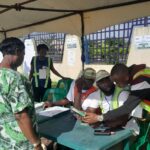It was a shocking story of the moment when, recently, an official of the Economic and Financial Crimes Commission (EFCC) reportedly committed suicide in Abuja. According to media reports, the deceased was found dead at his residence in the Federal Capital Territory (FCT).
The deceased is said to have been a member of Course 5 of the anti-graft agency’s Academy. Other details about the deceased include being a hardworking, well organised, and productive officer of the EFCC. The anti-graft operative reportedly battled depression as he also struggled with personal issues before his death.
Dele Oyewale, EFCC’s spokesman, told journalists that the agency would investigate the circumstances that led to the incident. He added that the agency has been exploring possible factors, including mental health issues and family challenges, that may have compelled the operative to take his own life.
According to an elaborate report by the Daily Trust, 42 Nigerians committed suicide within the first and second quarters of this year alone; with students topping the list with 11. While 15 of the victims consumed the deadly insecticide called ‘sniper’, four other victims died by setting themselves ablaze either with petrol or inside their vehicles. Two victims died by drinking acid, one by jumping atop a telecom mast while another victim jumped inside a river. These mind-boggling incidences are disturbing dimensions of managing life challenges.
- Fire outbreak at Dangote Refinery, concerns over environmental risks
- Security operatives battle protesters in Gwagwalada
Suicide is a phenomenon that cuts across the length and breadth of the country. Analysis of the recent suicide statistics shows that 16 of the suicide cases occurred in five states of the South West, with Lagos topping the group with 11 cases. Oyo State recorded two cases while Ekiti, Ogun and Ondo states had one case each. The South South zone recorded seven suicide cases within the period under reference in four states namely: Edo (2), Delta (2), Bayelsa (2) and Rivers (1). Similarly, eight suicide cases were recorded in the three South East states of Anambra (6), Ebonyi (1) and Enugu (1).
The North Central zone recorded five cases in four states involving two in Kogi and one each in Benue, Kwara and Nasarawa states. The North West states recorded three cases in two states; Kano (2) and Jigawa (1). Two cases were recorded in the two North East states of Borno and Bauchi.
A study by the Suicide Research and Prevention Initiative (SURPIN), conducted at the Lagos University Teaching Hospital (LUTH), revealed that “Out of every 66 suicide victims cumulatively recorded in 2018, only about 37.9 per cent committed or attempted it through conventional means, while nearly 62.1 per cent bade life farewell through the consumption of poison, especially the deadly chemical- Sniper.” The National Agency for Food and Drug Administration and Control (NAFDAC) would do better to regulate the sale of this pesticide.
There are several immediate and remote factors that could lead to suicide. They include untreated depression, death of a beloved one, divorce or breakup of a relationship, losing custody of children, rejection by family members, physical and sexual abuse, including rape, incarceration, drug and alcohol abuse, bullying and humiliation, molestation and stigmatisation, a serious loss such as that of a job, a house or money; terminal illness, hopelessness that sprout from feelings that things will never get better, a feeling of failure in life, financial problems, loneliness or social isolation, unemployment, mental illness, and family history.
Suicide is alien to our culture, and therefore, a taboo. Government, society, parents and individuals all have roles to play in halting the tide of suicide in the country. Suicide does not just happen suddenly. Parents and family members have the foremost role of identifying warning signs and taking measures to address such as soon as suicidal symptoms manifest in their children and siblings. Parents are advised to avoid putting undue pressure on their children over issues over which their choices matter, especially if they have come of age.
Government, which at all levels has over the years abdicated its responsibilities in the area of job creation, education and health, is encouraged to revive and strengthen social welfare offices and rehabilitation centres. Jobless graduates of sociology, counseling and psychology should be employed to work in social welfare offices and rehabilitation centres.
While we urge the government to resuscitate and re-define the N-Power programme, we call on community leaders to encourage their people to be their brothers’ keepers. The National Orientation Agency (NOA) should also embark on rigorous and sustained campaigns against suicide. It should collaborate with religious leaders to educate their congregations on the significance of patience and perseverance in life; citing historical evidence from the life and teachings of prophets, and other virtuous men of God.

 Join Daily Trust WhatsApp Community For Quick Access To News and Happenings Around You.
Join Daily Trust WhatsApp Community For Quick Access To News and Happenings Around You.


